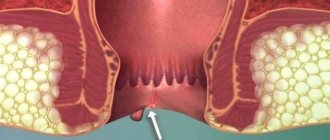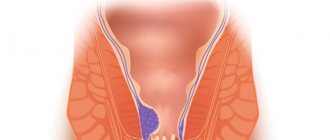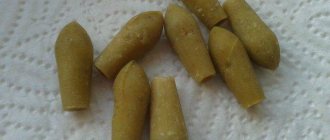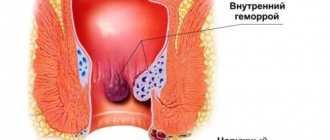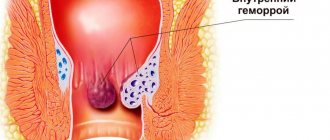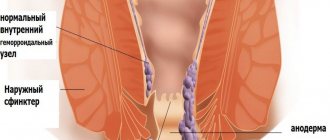Folk remedies and disease prevention
The 3rd trimester of pregnancy provides the opportunity to use various traditional medicines
A woman should be careful when choosing a prescription. Not all methods are safe
Some can harm the fetus and lead to early termination of pregnancy. Below are methods on how to treat the disease without causing serious harm. But you should always take into account the possibility of individual intolerance or an allergic reaction to a particular drug. Therefore, it is better not to use even traditional medicine on your own without first consulting a doctor.
Recipes for illness:
- A cotton swab is moistened with castor, ichthyol or sea buckthorn oil and applied to the venous node several times a day. In the case of internal hemorrhoids, the tampon is replaced with a turunda or a stick and inserted into the rectal passage. A similar recipe is acceptable for prevention purposes from the first trimester of pregnancy;
- suppositories made from raw potatoes have anti-inflammatory and vascular strengthening properties. To complement the pain relief effect, you should first freeze the potatoes and use them chilled. You have to be careful. The candle should not have too large a diameter or sharp corners. It must be used in such a way as not to injure the mucous membrane and not cause a secondary infection;
- Chamomile candles are prepared from a frozen decoction of the medicinal herb. They are a good antiseptic and effectively relieve pain due to their low temperature.
https://youtube.com/watch?v=z6TW1j27pfg
Having completely recovered from the disease, one should not forget that once touched, it can return after some time. To prevent this from happening, preventive measures are taken. Every day should start with light exercise, which can be supplemented with special gymnastics or yoga for pregnant women. A woman needs to establish an eating and drinking regime for easy bowel movements and the absence of constipation, and also not lift anything heavy. You should not sit or lie on your back for a long time. In the same case, if bed rest is recommended for a pregnant woman, it is necessary to elevate the buttocks area using a special pillow or cushion.
Hemorrhoids at any stage are an unpleasant disease that can affect any woman during pregnancy. Do not underestimate its dangers and put off visiting a doctor because of shame or reluctance to take any action. If left untreated, the unborn baby may be at risk and may require a caesarean section. The doctor will tell you how to treat the disease. By following his recommendations, you can completely forget about the disease.
"Relief": ointment based on shark oil
Shark oil ointments are used to treat hemorrhoids due to the following properties:
- antioxidant;
- anti-inflammatory;
- immunostimulating;
- normalizing metabolic processes in tissues;
- antimicrobial;
- normalizing blood flow;
- strengthening blood vessels;
- normalizing blood pressure.
In addition, many products can be used as an antibiotic.
"Relief" ointment for hemorrhoids during pregnancy can be used (except for the drugs "Relief Ultra" and "Deep Relief"), but only during the acute period of the disease and on the recommendation of a doctor. Therapy should not be long-term. Women with hypertensive toxicosis should avoid using this remedy.
Action of the drug:
- relieves inflammation;
- heals tears and cracks;
- strengthens blood vessels;
- increases immunity;
- relieves pain, burning and itching;
- prevents the formation of blood clots.
The ointment should be applied in a thin layer to the area of inflammation up to 4 times a day (for internal hemorrhoids, use an applicator).
However, it should be noted that some doctors generally do not recommend using the drug “Relief” while pregnant due to insufficient information about the effect of the drug’s components on the fetus. Therefore, when choosing a treatment, consultation with a specialist is mandatory.
Simple but effective
Drugs for severe inflammation and infection:
- The popular Vishnevsky ointment can also be safely used during pregnancy, however, this drug has special indications: inflammation and suppuration of nodes and underlying tissues. However, in such situations it is better not to take risks and not self-medicate, but to consult an experienced specialist. Typically, a cotton swab, generously lubricated with Vishnevsky ointment, is placed in the rectum for a period of 30 minutes. up to several hours.
- Levomekol ointment can also be used for severe inflammation. Inserted into the anus on a tampon for 60–120 minutes.
- Ichthyol ointment, well known to our grandmothers, is also safe and effective during pregnancy, when the “bumps” become enlarged and become infected. However, it is better to use this drug in combination with other drugs for greater effectiveness.
Herbal preparations:
- Fleming ointment is a 100% natural product that contains witch hazel, aesculus, calendula, menthol and zinc oxide. Zinc oxide helps dry out “wet” areas and promotes speedy healing. Menthol – cools the tissues for some time after applying the ointment. The remaining components in combination have proven themselves to be an effective remedy for the treatment of hemorrhoids. Reviews from women who used this drug during pregnancy confirm the effectiveness declared by the manufacturer.
- “Zdorov” cream for hemorrhoids is also developed on the basis of natural ingredients and includes wax. This product is safe and effective to use during pregnancy, if the woman does not have allergic reactions to bee waste products.
- Propolis-based ointment has anti-inflammatory and antimicrobial effects.
- Ointment based on calendula flowers. This drug has anti-inflammatory and bactericidal effects for hemorrhoids. Typically, calendula ointment is used for inflammation of nodes to suppress pathogenic bacteria. It is advisable to use together with drugs that have a healing effect.
- “Bezornil” ointment is very popular among herbal medicine lovers; it contains borneol, calamine, pearls, benzoar, amber and solid fats. The manufacturer claims complex anti-inflammatory, decongestant, antipruritic, hemostatic and regenerating effects. Reviews from proctologists show their skeptical attitude towards this drug.
Hemorrhoids often complicate the course of pregnancy, even if the woman has never previously noted the appearance of symptoms of this disease. The process of treating hemorrhoids during pregnancy should be treated with increased responsibility, since improper use of drugs or the use of products whose effectiveness can be questioned can harm the health of not only the mother, but also the child.
Ointment for hemorrhoids during pregnancy - reviews
Pregnant women respond well to various ointments for hemorrhoids. They alleviated the course of acute hemorrhoids, relieved pain and bleeding, and completely eliminated hemorrhoids by the time of birth.
Women, citing their pregnancy, prefer to use the most harmless ointments. Thus, heparin ointment is popular. With its help, the nodes quickly decrease and swelling in the anus goes away.
Gepatrombin ointment is no less praised for its analgesic effect and ability to stop bleeding. In addition, women also note a mild laxative effect, which makes going to the toilet very easy.
Also, during pregnancy and in the postpartum period, Fleming's ointment is often used. It is absolutely non-toxic and at the same time cools well and relieves itching.
If hemorrhoids appear during gestation, ointments should be selected only by a doctor. Despite the fact that ointments are used locally, their substances can penetrate the body and harm the child, so it is important to always weigh all the risks and benefits of treatment.
Conservative treatment methods
Treatment of hemorrhoids in pregnant women does not allow the use of all medications. Many of them include active components that are absorbed into the blood. This can negatively affect the condition of the child, especially in the first trimester of pregnancy.
Therapeutic tactics are determined by the attending physician depending on the characteristics of the course and form of the disease. In pregnant women with mild symptoms in the first stage of the disease, treatments such as diet, gymnastics, correction of the daily routine, and the use of anti-inflammatory, analgesic suppositories, and herbal decoctions are used.
The second stage of hemorrhoids is accompanied by pronounced symptoms. Here, patients complain of pain during bowel movements, itching, burning, and discomfort. To eliminate these manifestations, pregnant women are prescribed ointments, creams and rectal suppositories that help reduce these symptoms. If necessary, oral medications may be prescribed. In addition to medications, a diet and special exercises are selected.
Stages of hemorrhoids and their symptoms
At the third and fourth stages of the pathology, when hemorrhoids bleed, fall out, urination and defecation are difficult, the woman experiences severe pain, burning, discomfort, and the use of radical methods is often required. To treat the affected vessels, surgery is performed in the form of sclerotherapy, coagulation or doping with latex rings.
Important! The quality of treatment depends not only on the competent choice of medications, but also on the efforts made by the patient herself.
Safe ointments for pregnant women
Treatment of hemorrhoids during pregnancy is often carried out using products in the form of ointments, gels, and creams. The main requirement for the drug is safety for mother and child. These medications include:
- suppositories based on sea buckthorn oil are homeopathic suppositories that can be used to fight inflammation, swelling, and burning. Sea buckthorn is used as an antimicrobial and analgesic;
- Relief is an ointment that includes components extracted from shark liver. This medication is prescribed for the treatment of hemorrhoids during pregnancy and lactation. The substances in the product are not absorbed into the blood, so the ointment is safe for the mother and fetus;
- Troxevasin - helps alleviate the manifestations of pathology at all its stages. The ointment is used for the treatment of internal and external hemorrhoids;
- Fleming's ointment - used to combat the disease during and after pregnancy;
- glycerin suppositories are a proven and safe remedy used among children, pregnant women and the elderly. Suppositories have a laxative, softening effect for constipation.
Relief is considered one of the most effective and safe drugs for the treatment of hemorrhoids in pregnant women.
The dose and number of ointment applications is determined by the attending physician based on the diagnosis and symptoms of the pathology.
Preparations for internal use
A common cause of development and exacerbation of venous disease in the rectal area is constipation. They negatively affect the condition of blood vessels and aggravate the course of an already developed disease. To treat stool disorders, laxatives are used internally for hemorrhoids. The following are considered the safest:
- Duphalac - available in the form of tablets or syrup. The active components of the product help soften stool, stimulate intestinal motility, thereby eliminating constipation;
- Senade tablets are a herbal preparation approved for use among pregnant girls and women. The medicine includes natural ingredients that are not capable of harming the mother and baby. The laxative has a gentle effect on the motility of the large intestine, facilitating the passage of feces;
- Phytomucil - includes plantain seeds, increases and softens the contents of the intestines, thereby promoting the excretion of feces. In addition, it has a mild choleretic and stimulating effect.
All medications are used under the strict supervision of a specialist. Self-medication during pregnancy is not allowed.
What ointment for hemorrhoids can be used during pregnancy?
A proctologist who has experience working with pregnant women should deal with hemorrhoids during gestation. When prescribing ointments or gels, he takes into account not only the degree of hemorrhoids, but also the gestational age.
Basically, only drugs for external use are used, less often - tablets. Most contain active components that are absorbed into the bloodstream and can reach the baby, affecting his condition. And this is highly undesirable during pregnancy. Therefore, a woman needs competent prescription of suitable ointments, of which there are plenty.
All ointments have certain properties, for example, they relieve swelling and sanitize the anal area to prevent the development of proctitis or suppuration. Some ointments act solely as an analgesic or promote the outflow of blood from the nodes. To understand when a certain ointment is prescribed, consider the entire list of approved products.
The most popular anti-hemorrhoid ointments and their use during pregnancy
Heparin ointment
Heparin ointment, the main component of which is the anticoagulant heparin, quickly and effectively relieves inflammation, promotes the resorption of blood clots and prevents the formation of new ones. The effect is enhanced by the presence of benzocaine and benzyl nicotinate in the drug, which promote the penetration of heparin into tissues and also provide an analgesic effect. Indications for the use of Heparin ointment are enlargement of external hemorrhoids, the presence of a pronounced inflammatory process, and a high risk of developing thrombosis of hemorrhoids.
Heparin ointment is contraindicated for anal fissures, anal erosion, increased bleeding, and a risk of spontaneous abortion. The drug is not prescribed in the 1st trimester.
Since the ointment has a number of side effects and contraindications for use, patients during pregnancy can use it only after consultation with their doctor.
Gepatrombin G
Gepatrombin G ointment has a thrombolytic effect, relieves swelling and inflammation, has an analgesic effect, and helps reduce dilated veins. Hepatrombin G is effective for all forms of hemorrhoids (internal, external, mixed), anal fissures, itching of the anal area, eczematous lesions of the anal area.
Contraindications for use are individual intolerance to the components of the drug, increased bleeding, as well as the addition of a secondary infection.
The drug is approved for use from the 2nd trimester of pregnancy due to the presence of a hormonal substance in its composition.
Ointment Relief
The active ingredient in Relief ointment is shark liver oil. It helps stop bleeding, accelerates the healing of damaged tissue, eliminates the inflammatory process, and helps get rid of the feeling of itching in the anal area. In addition, the ointment has a vasoconstrictor effect and relieves swelling. Effective in patients with anal fissures and itching in the anus.
The drug is prescribed for both external and internal hemorrhoids.
Contraindications to the use of Relief ointment are intolerance to the components of the product, the presence of blood clots, granulocytopenia, and arterial hypertension. This ointment for hemorrhoids during pregnancy in the 3rd trimester is prescribed only according to strict indications.
Ointment Relief Advance
Relief Advance ointment, in addition to shark liver oil, contains benzocaine, which has an analgesic effect. Thanks to this composition, the product allows you to eliminate the inflammatory process, get rid of itching, burning, reduce pain, and also reduce bleeding and promote rapid regeneration of damaged tissues.
It has a softening effect, which allows you to eliminate severe pain during and/or after defecation.
The use of Relief Advance ointment is indicated in the presence of erosions in the anus, ulcers of the rectal mucosa, anal itching; Contraindicated in the presence of individual intolerance to the components of the drug and in thromboembolic conditions.
Fleming's ointment
Fleming's ointment is a homeopathic preparation that contains extracts of calendula, horse chestnut, witch hazel, as well as menthol and zinc compounds. The manufacturer claims that this composition helps eliminate the inflammatory process, prevents the development of infection, anesthetizes and strengthens the walls of blood vessels in the anal area.
Fleming's ointment has virtually no contraindications and can be used at any stage of pregnancy
Fleming's ointment is prescribed for external hemorrhoids with the release of blood, mucus and venous exudate from the anus (wetting hemorrhoids).
The drug has no contraindications other than intolerance to the components of the drug.
Homemade ointments
According to reviews from doctors and patients, ointments prepared at home can be effective in the early stages of hemorrhoids during pregnancy. Their composition as an active ingredient may include propolis, infusions of calendula, oak bark, St. John's wort, kidney grass, calamus, chamomile flowers and other medicinal plants. For the base, Vaseline, pork fat, high-quality purified vegetable oil, and glycerin are used. Despite the safety of such products, they can also be used by pregnant women only with the permission of a doctor.
Ointments for hemorrhoids with venotonic and tonic effects
If hemorrhoids occur with severe swelling and frequent blood loss, it is advisable to choose ointments that can bring blood vessels to normal tone and have a high venoprotective effect. They contain substances that not only relieve external manifestations, but also support the health of the veins from the inside.
Troxevasin - ointment for hemorrhoids during pregnancy
The action of the drug is aimed at increasing the tone of the venous system and improving lymphatic drainage. The ointment makes the vessels elastic and less brittle, thereby reducing the risk of thrombosis, reducing inflammation and pain.
During pregnancy, it is used to prepare a gauze application for hemorrhoids, sphincter spasm, and insufficiency of the venous system. Not prescribed if there is an infectious process in the anus.
Troxerutin for hemorrhoids during pregnancy
The drug is very similar in its effect to the previous drug. Helps restore impaired blood circulation, helps with severe swelling and resolves blood clots.
The ointment is used only for external treatment of nodes; apply a little product to the nodes in the morning and before bed for hemorrhoids, swelling and spasms of the anus, thrombosis. Contraindicated in the 1st and 2nd trimester of pregnancy.
Relief ointment during pregnancy for hemorrhoids
Combined ointment based on shark liver. This unique component stops bleeding, stimulates regeneration processes, and alleviates the general symptoms of hemorrhoids. It also contains phenylephrine. It provides a vasoconstrictor effect to prevent re-bleeding.
Prescribed for internal bleeding hemorrhoids and injuries. In the presence of acute proctitis, infection, hypertension, risk of blood clot rupture, blood disease, it is not used.
Ointment during gestation is prescribed under the responsibility of the doctor. The product is applied externally or rectally using an applicator.
CAUSES OF HEMORRHOIDS IN PREGNANT AND GIVING WOMEN
The main factors for the development of hemorrhoids during pregnancy and after childbirth are the following:
- Chronic constipation. When a woman has chronic constipation, stretching increases and stress on the walls of the rectum during bowel movements increases. And this in itself leads to the formation of hemorrhoids in the intestines. Firstly, a person in the toilet strains during constipation, overstraining the hemorrhoidal veins, and secondly, during constipation, the stool becomes very hard and simply begins to irritate the swollen veins. The incidence of constipation in pregnant women is much higher, which is mainly explained by a decrease in intestinal tone during pregnancy.
- Sedentary lifestyle. In medical terms, physical inactivity (that is, a sedentary lifestyle) causes blood to stagnate in the venous plexus, which eventually results in vein thrombosis and the formation of hemorrhoids in the rectum. Due to their own condition, pregnant women are forced to lead a sedentary lifestyle, more or less, and therefore the risk of developing hemorrhoids is much greater.
- Impaired blood circulation directly in the lower half of the body is very common for pregnant women. An enlarged uterus puts additional pressure on the veins. During pregnancy, the inferior vena cava is compressed by the growing uterus with the developing fetus, which causes stagnation of blood in the veins of the rectum and legs.
- During childbirth, a woman's intra-abdominal pressure increases greatly. During childbirth, a woman also runs the risk of “earning” this disease or aggravating it, due to strong pressure and intense tension in the anal area while trying to give birth to a baby. Therefore, hemorrhoids after childbirth are considered almost a common occurrence.
Pregnancy and its frequent companion hemorrhoids
Dilation of hemorrhoidal veins is a typical manifestation of varicose veins in the vascular system. As a result of a hereditary defect on the part of the vascular wall, the formation of cavernous plexuses occurs, which accumulate venous blood in their cavities. This factor causes the formation of venous stagnation in the pelvic area, which subsequently provokes the development of inflammation and worsening of the process.
Depending on the location of varicose veins, there are such forms as:
Internal lump
- External hemorrhoids. Nodules begin to protrude above the anus, causing damage to the sphincter. In most cases, patients can independently identify the disease. In addition, due to ease of access, the effect of the therapy is improved.
- Interior. Nodes are characterized by the appearance of protrusions in the mucous membrane above the anus. They can remain undetected for a long time, and confirmation of the diagnosis occurs in the late stages of the pathological process.
- Combined hemorrhoids. This type is characterized by a combination of several.
Popular drugs
It is not so easy to understand the huge range of ointments offered, and each product has its own mechanism of action:
- Vishnevsky ointment. There is nothing superfluous in its composition: the antiseptic substance xeroform, a mixture of tar and castor oil. The ointment has proven itself as an excellent anti-inflammatory medicine and pain reliever. There are absolutely no side effects, and use is possible at any stage of the disease. Before application, the anus area is thoroughly washed with soap, dried with a clean towel, after which ointment is applied on a piece of sterile gauze. The duration of the procedure is no more than 3 hours. A wonderful combination of cost and results from use.
- Levomekolev ointment. A universal remedy that includes antibacterial, regenerating and anti-inflammatory effects. Prevents the development of infection and has a complex effect. After just a few uses, anal fissures heal, the skin is restored, redness and swelling of the tissues disappear. The first use helps relieve itching and pain. However, this ointment for hemorrhoids during pregnancy is prescribed in very rare and extreme cases! Contraindications include all three trimesters and the lactation period. If the doctor decides to include Levomekol in the course of treatment, there are good reasons for this, you cannot use the drug yourself.
- Fleming's homeopathic ointment. Thanks to the menthol in the product, swelling, pain and itching are relieved after the first use. Blood circulation in the pelvic area improves, healing processes are accelerated. The natural remedy has an antibacterial effect and resolves hemorrhoids. The ointment is applied to a small piece of sterile gauze or bandage and used three times a day as a compress. Treatment takes about a week, but can be extended as prescribed by the doctor.
- Heparin ointment is the safest and most time-tested drug. It removes hemorrhoidal blood clots, lumps, swelling and hematomas. The pain decreases, the inflammation goes away - and all this in a matter of days. The use of heparin ointment is not recommended in case of low blood clotting or individual sensitivity to the components. The product is used in the form of compresses 3 times a day, the course lasts at least 2 weeks.
- Hepatrombin is used for all types of hemorrhoids: external and internal. Successfully removes itching, burning, inflammation, reduces bumps, heals cracks and is an excellent prevention of thrombosis. Among the contraindications is pregnancy, but when collecting an anamnesis, the doctor may prescribe Hepatrombin.
- Troxevasin during pregnancy has a beneficial effect on capillary walls. Swelling and inflammation are relieved, veins are toned. It is not very effective as a solo remedy, so the specialist will additionally prescribe a diet and therapeutic exercises. The course of therapy is developed individually, depending on the patient’s condition. Contraindications include possible allergies to one of the components, the first trimester of pregnancy, gastrointestinal diseases and renal failure. Treatment can last from 1 to 3 months.
- Proctosan is able to reduce pain in a matter of minutes, thanks to lidocaine. Burning and itching go away, tissue swelling and inflammatory processes decrease. The drying and astringent effect helps stop bleeding and heal cracks. The remedy is equally effective at all stages of hemorrhoids, and complex therapy is not required for complete recovery.
Only a specialist can select the most effective remedy after a personal examination and conversation with the pregnant woman. In women’s hands is not only their own health, but also that of their unborn baby. For this reason, even the safest drug can be used only after consultation with your doctor.
How to understand that hemorrhoids are developing during pregnancy
The first manifestations of proctological problems are observed after the equator of pregnancy. Due to congestion and difficult bowel movements, the veins in the intestine expand, become enlarged, and protrude in the form of hemorrhoids.
Without proper treatment, hemorrhoids progress quickly. Closer to the third trimester, the muscles that support the venous nodes weaken and lose elasticity. This leads to complete loss of hemorrhoidal cones, their trauma and bleeding.
In the first stages of the disease, inflamed nodes protrude from the anus after defecation, but soon return to their original position. They do not cause pain or discomfort and can be easily cured if you start using suppositories or ointment for hemorrhoids during pregnancy in time.
As the pathology progresses, the symptoms intensify. Hemorrhoidal cones can no longer be reduced into the intestine on their own, the woman suffers from severe pain during bowel movements, and severe blood loss occurs. A woman feels discomfort all the time, which affects the comfort of her life.
Advice! You can understand that something is wrong with the veins even before the external manifestations of hemorrhoids. Itching sensations, traces of blood, false urge to go to the toilet are early warning signs of the formation of hemorrhoidal “bumps”.
About heparin, vitamin A, venotonics, Prelax and Forlax
Hemorrhoid cream containing heparin is an effective remedy in the fight against the disease. The pharmaceutical industry produces various types of gels and ointments containing this substance. If a pregnant woman has thrombosis of hemorrhoids, medications with heparin are often prescribed. But if a woman suffers from bleeding disorders, its use is strictly prohibited. Vitamin A and sea buckthorn oil are often found in ointments that can be used by pregnant women. These components are especially convenient because the only obstacle to their application is the body’s individual intolerance. As for systemic drugs, they also have to be used in the second stage of hemorrhoids. Among internal remedies, women are most often prescribed venotonics. They are necessary to increase tone and strengthen the walls of the veins. The course of taking venotonics lasts 2-3 weeks.
At the second stage of the disease, it is allowed to use internally Aspirin, Curantil, Troxevasin and a number of other drugs. At the same time, pregnant women are also prescribed laxative medications, which include Prelax, Forlax. However, in the later stages of the disease, conservative therapy is ineffective, and surgical intervention is required to avoid complications during childbirth and protect the life and health of the woman and her baby. Indications for conservative treatment are necrosis, strangulation or acute inflammation of hemorrhoids. It is generally accepted that if therapy is carried out correctly in the initial stages of the disease, its development can be stopped and hemorrhoids can be cured.
Clinical stages and symptoms
Uncomplicated hemorrhoids do not hurt and proceed almost unnoticed for a woman who has other problems associated with pregnancy. Further, the disease will progress, moving from one stage to another, if adequate treatment is not carried out.
- In the first stage of hemorrhoids, there is slight discomfort, itching or burning in the anus, a feeling of a foreign body or insufficient bowel movements after bowel movements. At this time, no external changes are yet detected in the perianal area, or small external nodules appear around the anus. With an increase in internal cones, slight hyperemia may appear in this area from mucus flowing from an incompletely closed sphincter.
- The second stage of hemorrhoids is characterized by the loss of enlarged nodes during bowel movements, the appearance of pain and traces of blood on toilet paper or underwear. The nodes can still be retracted into the rectum after straining stops.
- The third stage of hemorrhoids - the nodes fall out of the anus during defecation, coughing, sneezing and other stress; they can still be tucked inside by hand. The woman is worried about pain, bleeding, difficulty in bowel movements, and constant loss of lumps.
- You can reach the advanced stage of hemorrhoids if you do not consult a doctor and self-medicate. It is no longer possible to endure the pain; the nodes reach enormous sizes, cannot be reduced, and can become pinched and inflamed. Such hemorrhoids are often accompanied by thrombosis and inflammation of dilated veins, there is a threat of bleeding and necrosis of nodes, involvement of surrounding tissues in the pathological process. In this case, emergency measures are required, otherwise the situation during childbirth will worsen even more.
It is possible to completely get rid of the problem only after the birth of the baby, however, you can slow down the development of the disease if you follow the doctor’s recommendations on diet and regimen, as well as using topical ointment or cream for hemorrhoids for pregnant women
